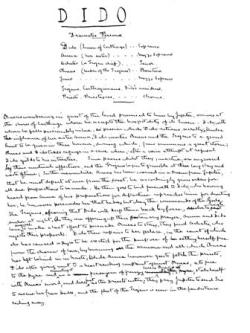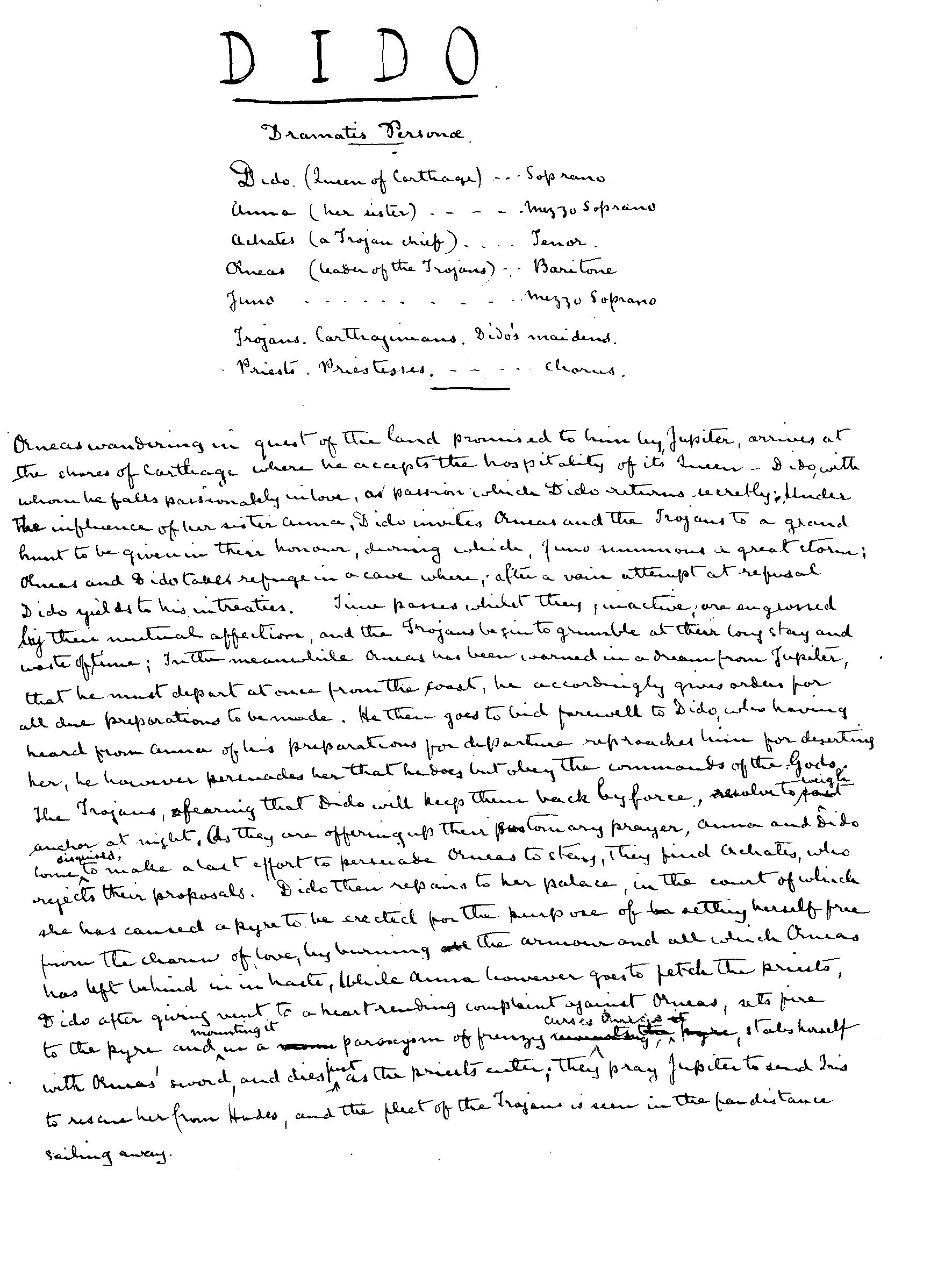Dido and Aeneas

Enlarge

Opera in five acts, requiring five sets, SAAB soloists, 1 male and 1 female chorus, orchestra of full strings, 2 flutes, 2 hautboys, 2 clarinets in B flat, 2 bass clarinets in B flat, 2 bassoons, 4 horns in F, 2 trumpets in C, 2 tenor trombones, bass trombone, contra bass tuba, timpani and harp.
Note on the title: The title of this opera is given in the autograph complete vocal score as simply Dido. It is inscribed as the work of George William Louis Marshall‑Hall, the composer, the libretto being the work of his brother, Algernon S. Marshall‑Hall. This appears to be the earliest part of the archive. It is probable that this dates from the period before the Australian appointment and possibly indicates that the opera is part of the Marshall‑Hall juvenilia. The title: ‘Dido and Aeneas’ is inscribed in Marshall‑Hall’s mature hand in the piano and vocal score of Act II, but the title ‘Dido’ reappears in the piano and vocal score of section five of Act I, where the work is referred to as a ‘dramatic cantata.’ As no other complete version of the work is present, it would seem that at least Act I, Scene IV, and all of Act II were later revised without the whole work undergoing reconstruction.
Synopsis
[Amended version of the synopsis contained in M‑H 1/3‑3.] Aeneas, [leader of the Trojan forces], wandering in quest of the land promised to him by Jupiter, puts in at the port of Carthage where he accepts the hospitality of its Queen, Dido. Aeneas falls in love with Dido who secretly returns his passion. Under the influence of her sister Anna, Dido invites Aeneas and the Trojans to a grand hunt to be given in their honour. At the height of the chase Juno summons a great storm, forcing Aeneas and Dido to take refuge in a cave where, after a vain attempt at refusal Dido gives in to Aeneas’s entreaties. Time passes while the lovers remain engrossed in one another and the Trojans become restless through enforced inactivity. Jupiter appears to Aeneas in a dream, warning him that he must depart at once. Aeneas orders the ships made ready and goes to take leave of Dido. The Queen has been told by Anna of the preparations going on around the ships and reproaches Aeneas for deserting her. He pleads that it is at the command of the gods. The Trojans, fearing that Dido will hold them by force, resolve to weigh anchor in the night. As they are offering up their customary prayers Anna and Dido come in disguise to make a last effort to persuade Aeneas to stay. They find Achates [a Trojan chieftan] who turns them back. Dido returns to the palace where, in the courtyard, a pyre has been erected on her orders. Her intention is to free herself from the grip of love by burning the armour Aeneas has left behind in his haste. Anna leaves to fetch the priests. Dido sings a passionate complaint against Aeneas, lights the pyre and mounts it in a paroxysm of frenzy, cursing Aeneas, She stabs herself with Aeneas’s sword and dies as the priests enter. They pray to Jupiter to send Iris to rescue her from Hades. The fleet of the Trojans is seen in the distance sailing away.
Holdings
- M‑H 1/3‑1
Autograph full score of Act I, Scene IV. Green leatherette bound volume with ruled impress edge back and front. 48cm x 37.5cm x 0.5cm. Black inked score. One blank frontpage, one blank endpage. The first recto is inscribed ‘Dido and Aeneas. Act I Scene IV’ and signed: ‘G.W.L. Marshall‑Hall.’ 30-stave score paper without imprint or pagination. Scored for 2 flutes, 2 hautboys, 2 Clarinets in Bb, bass clarinet in B flat, 2 bassoons, 4 horns in F, 2 trumpets in C, 2 tenor trombones, bass trombone, contra bass tuba, kettledrum, violins, violas, cellos, double basses.
- M‑H 1/3‑2
Second full score of Act I, Scene IV. Green leatherette bound volume with ruled impress at edge back and front. Gold inscribed front cover: ‘Dido and Aeneas. Act I. Scene IV. Full Score.’ The recto of the frontpage is signed: ‘G.W.L. Marshall‑Hall, Melbourne University, Victoria, Australia.’ The first recto of the score is inscribed ‘Dido and Aeneas [Act I Scene IV]. G.W.L. Marshall‑Hall’ and is so signed at the foot of the page also, where the words ‘Melbourne University Victoria’ are again added. 20-stave music score paper. Imprinted ‘BREITKOPF and HÄRTEL. No.12. C.’ with the bear and shield with a legioneer’s head and the date 1719 used as an emblem. 48 paginations.
Scoring indicated: flutes, hautboys, clarinets in B, bass clarinet in B, bassoons, 4 horns in F, trumpets in C, 2 trombones, bass trombone, tuba, kettledrums, 2 harps, violins, violas, cellos and double basses. Binding and cutting of the left edge of the page has obliterated some numbers, but the actual score is for two of each. Compare with M‑H 1/2‑1 and M‑H 1/2‑6: 1 to 18.
- M-H 1/3-3
Autograph complete piano and vocal score. Navy leatherette bound volume. Tooled and gold embossed on the cover: ‘Music.’ 23.5cm x 29.5cm x 0.75cm. Black inked score. 200 paginations. Predominantly red marbled endpapers. The first recto inscribed ‘Dido. Opera in five Acts by Algernon. S. Marshall‑Hall. Music by George W.L. Marshall‑Hall.’ The first verso is blank but the second verso is inscribed ‘Index.’ The page is partially obscured by newspaper clippings on gardening pasted over the handwritten entries. Pagination of the Acts is indicated together with scenes and important entries. The second recto holds the title ‘Dido’ and a list of characters, viz:
- DIDO [Queen of Carthage]—Soprano
- ANNA [her sister]—Mezzo Soprano
- ACHATES [a Trojan chief]—Tenor
- AENEAS [leader of the Trojans]—Baritone
- JUNO—Mezzo Soprano
- Trojans. Carthaginians, Dido’s maidens.
- Priests, Priestesses—Chorus
A synopsis follows. At p.168, the score ends at the half page and is inscribed ‘The End. George W.L. Marshall Hall [no hyphen].’ Then follow paginations 171-200 which are almost totally covered in newspaper clippings on gardening. These are obscuring music in the same hand as the rest of the score, being additions and insertions to it.
- M‑H 1/3‑4
Manila folder holding a piano and vocal score of a scene from Dido and Aeneas. 14 pages (7 sheets) of unpaginated 12-stave score paper. Scored in black ink. No imprint. 30.75cm x 24.25cm. The first recto is inscribed ‘Scene from Dido. A Dramatic Cantata’ and is roughly signed ‘GWLMH’ run together. This scene in fact corresponds to p.25 of the vocal score and its continuation in M-H 1/3‑3, i.e., it is the second last section—Section five of the Index of Act One of Dido.
- M-H 1/3‑5
Black leatherette bound volume with impressed design on back and front covers containing a piano and vocal score of Act II of Dido and Aeneas, the front cover impressed ‘Music.’ The inside of the front cover is inscribed in pencil: ‘Dido and Aeneas Act II by G.W.L. M‑H’ in Marshall‑Hall’s hand. Also: ‘Patey and Willis. 44 gt [Great] Marlborough St, London.’ 23.5cm x 29.5cm x 0.5cm. 12-stave Acme score paper. No imprint. The pages are sewn into the cover. Black inked. No paginations. 29 occupied sheets, i.e. 58 unmarked pages, the last verso blank. The end page marked: ‘End of Act II’ and signed ‘G.W.L. M Hall [no hyphen].’ Some overscoring occurs at the presumed p.15. Additions in pencil occur at p.35 bar 3, p.38 line 2, p.41 last bar, p.42 last line, p.48 second line.
- M‑H 1/3‑6: 1-36
Brown paper holder inscribed in red pencil: ‘Dido and Aeneas. parts’ and in plain pencil: ‘Professor G.W.L. Marshall Hall [no hyphen]’ and ‘Full Scene in Inventory [?].’ Beneath the red-pencilled title page in plain pencil is written: ‘Act I Scene IV.’ The contents are as indicated. Score paper for all the parts is of uniform size 34cm x 27cm and is imprinted ‘B.C.’ on a lyre design as emblem and under it ‘No.2.’ All parts are in black ink with the same heading: ‘Dido and Aeneas. Act I. Scene IV’, followed by the composer’s name and the part intended. Red pencilled alphabetical rehearsal cues present throughout. Present are: 7 first violin parts, 8 second violin, 3 viola, 3 violoncello, 2 double bass, 1 first and second Flute, 1 oboe, 1 clarinet, 1 bassoon, 1 first and second horn, 1 third and fourth horn, 1 trumpet, 1 first and second trombone, 1 bass trombone, 1 bass tuba, 1 timpani, 1 harp.